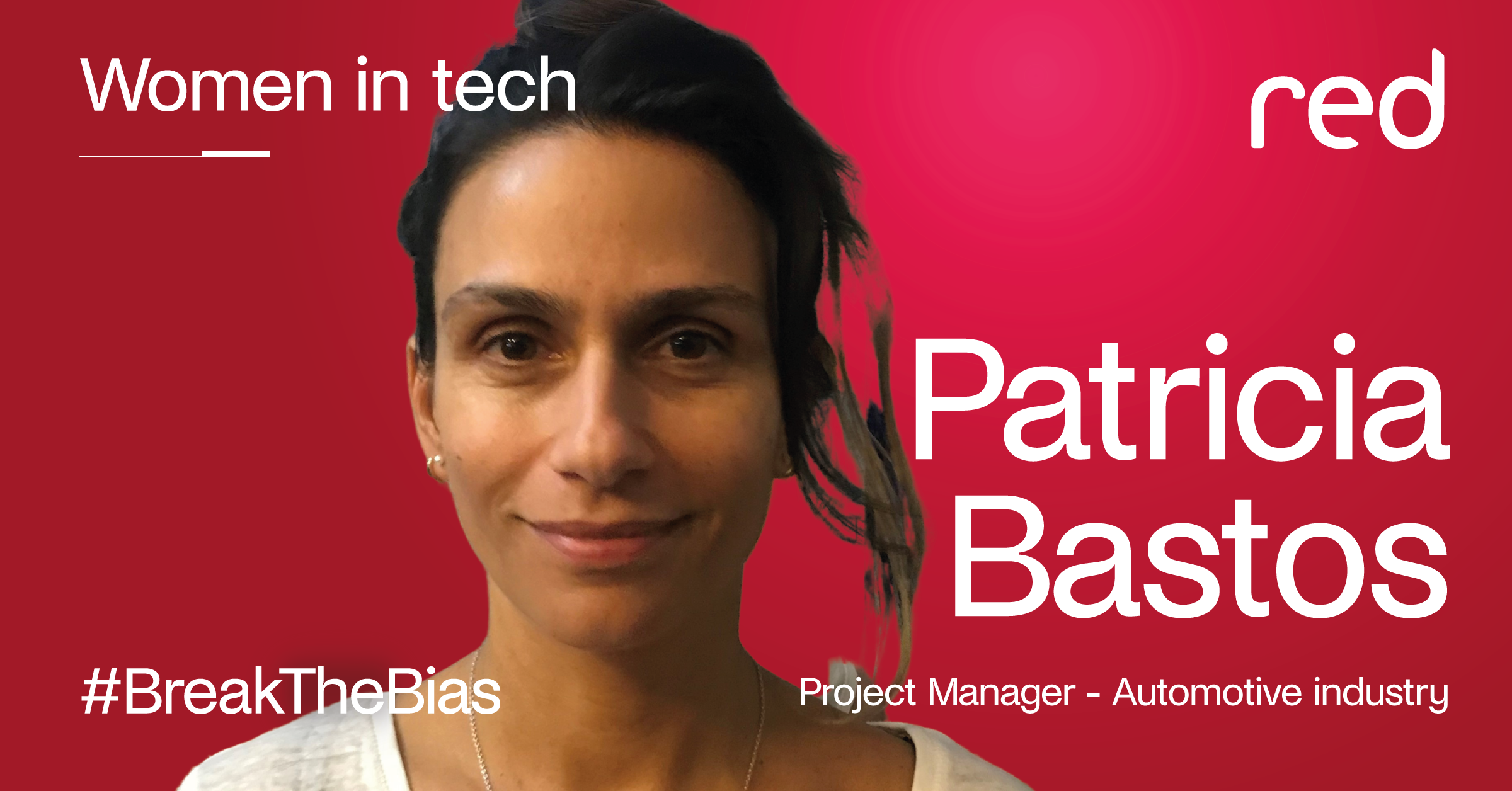Read-up with RED.
Women in Tech | RED Global Q&A session with Patricia Bastos
Blogbeitrag

Today we spoke to Patricia Bastos, a Project Manager who works in the automotive industry. What are the challenges she faced throughout her career, how she overcame gender bias and how she found her mentors? Read on the interview with Patricia for some great female industry insights.
1. Tell us about yourself.
My name is Patricia, I'm a Project Manager at Alliance Automotiv. I'm Brazilian and I've lived in Germany for 2 years. My work is 80% remote.
2. Can you tell us what you do in your role on a day-to-day basis?
I develop a methodology to manage projects that take place in 4 countries at the same time. I hold meetings with stakeholders, I present frameworks, I use collaborative tools, etc.
3. What’s the most exciting thing about your job?
Undoubtedly it is working within a culture different from mine.
4. What influenced you to pursue a career in tech? How did you get into tech? Did you always know that working in technology was what you wanted to do?
I started working in technology because I wanted to make money. Also 20 years ago, it looked like an area with many mysteries to be discovered and that fascinated me.
5. What are the biggest challenges you’ve faced in your career?
I didn't have a technical formation and I had to show that my managerial competence was what mattered. In some countries where I worked, they already had sexist teams who preferred to have men as managers. I asked for help from some men to help me with the situation. Many times, I couldn’t have done it alone.
6. Do you feel there is gender bias in the workplace?
No, not in my in my current job. Although men predominate, I feel no difference for being a woman.
7. Have you experienced gender bias? If so, how did you overcome it or how are you managing it?
The women are gaining more visibility and power and I believe that everyone has gone through gender bias challenges. Nowadays that doesn't happen to me. But in the past, I tried to find strategies (depending on the situation) to overcome it. I tried to impose myself with my voice, I tried to be "nice" to be accepted (I'm not proud of it, but I did) and I asked other men for help to get me on the team.
8. What do you think are the biggest obstacles that a woman working in the technology sector faces?
The world of technology has many men and in many situations a woman may be the only female in the team. It is important to break these paradigms and have more and more women in the tech world.
9. Do you feel that women have the same opportunities as men in the tech industry?
I think it depends on the competence of each one. But factors such as the woman getting pregnant, taking care of children, unfortunately for some people can be a disadvantage.
10. Do you think it is harder for a woman to grow her career and have a personal life? And if so, how can we overcome these challenges?
With the traditional way of life I think it is more difficult for women. For example: when a child gets sick, why does the woman usually miss work? This way of thinking and acting needs to change.
11. How has the industry changed since you’ve started your career?
New technologies, tools and new needs have been changing the way of working in Technology.
12. Have you had any mentors who’ve helped you grow?
Many!!!!! I think I was very lucky, but I was also always ready to receive feedback and think about it later. Knowing how to listen and take advantage of advice was one of the most important things for me.
I’ve always found mentors in my workplaces. And I don't think a good mentor is someone who doesn’t know you, who gives advice on social media because each case is different, and it deserves all the attention.
To find my mentors I first looked at people I admired. And it’s important to think about why you admire a person. I tried to get closer to them, ask for feedback, do small talks... and I’d notice if the person was available to me.
13. How has the pandemic influenced your work/life balance?
I spend less time with transport, work more productively and focused, have more time for myself and my family.
14. Do you have any role model women in tech that you would advise young girls start paying attention to?
Sure!!!
Renata Ramos
Ingrid Panini - https://www.instagram.com/ingridpaganini/
Liria knutti - https://www.instagram.com/elas_c_level/
15. What advice would you give to a woman considering a career in tech?
Study, work and be close to good professionals, the results will come with time.
Breaking the bias in the workplace is a collective effort and as Patricia highlighted, men play an important role in supporting women. However, there are many ways men can become women’s allies. From speaking up when women are treated unfairly, to mentoring and advocating for them.
We are thankful to Patricia for taking the time to share her experience with us and if you liked the interview, make sure you check out the other ones from our series Women in the Workplace.
RED Global Q&A session with Agathe Large
Die große Frage: SAP Custom oder Standard?
Ressourcen
Die Frage nach einer standardmäßigen oder maßgeschneiderten Lösung stellt sich bei jeder SAP-Implementierung. Und das aus gutem Grund. Beide Ansätze haben ihre Vor- und Nachteile und können weitreichende Auswirkungen auf Ihr Unternehmen haben.
Doch wie gut haben maßgeschneiderte Systeme in der Pandemie abgeschnitten, wenn man bedenkt, wie schnell sich Unternehmen an die vollkommen neue Situation anpassen mussten? Wir haben unsere Kunden gefragt, ob die maßgeschneiderte oder die standardmäßige Lösung die bessere Wahl war.





